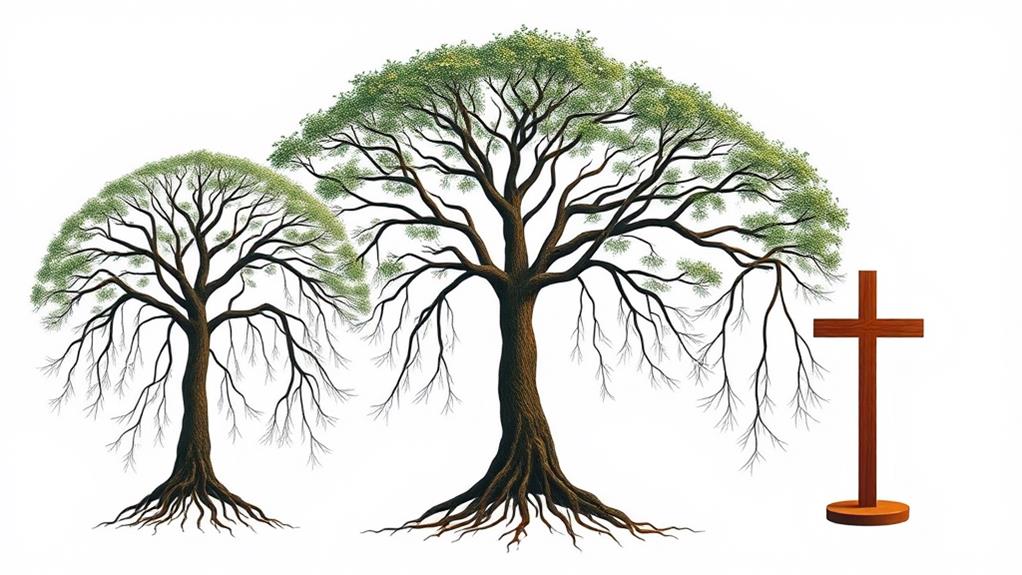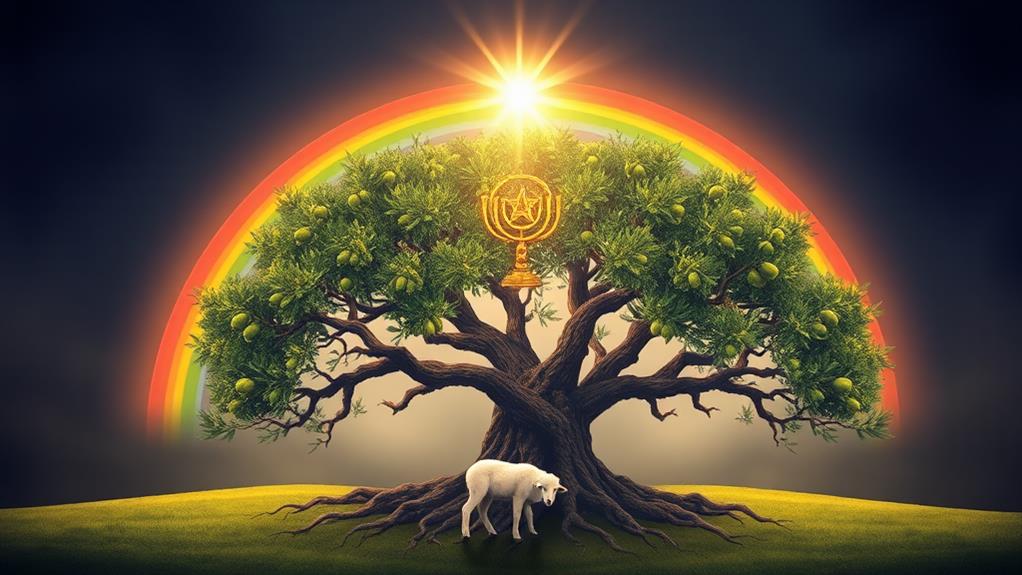The Biblical Significance of the Number 14: Unveiling Hidden Meanings
The biblical significance of the number 14 is multifaceted and profound, symbolizing deliverance, salvation, and divine perfection. Its appearance in Jesus' genealogy, structured into three sets of 14 generations, underscores the legitimacy of Jesus and God's deliberate intervention in human history. The Passover feast on the 14th day of the first month further emphasizes themes of deliverance and salvation, reflecting God's unwavering love and mercy. The number 14 represents a double measure of completeness and divine intervention, conveying deeper spiritual truths and divine messages. Exploring its various occurrences and interpretations in Scripture reveals the depth and richness of God's plan for humanity.
Key Takeaways
- The number 14 in the Bible symbolizes spiritual perfection, deliverance, and divine promises, reflecting the significance of the base number seven in biblical numerology.
- Jesus' genealogy is structured into three sets of 14 generations, emphasizing spiritual completeness, divine orchestration, and the legitimacy of Jesus.
- The Passover feast on the 14th day of the first month symbolizes deliverance and salvation, highlighting God's unwavering love and redemption for humanity.
- The number 14 represents a double measure of completeness and divine intervention, conveying deeper spiritual truths and divine messages through numerical patterns in Scripture.
- Historical examples like the Passover and Jesus' sacrifice underscore themes of salvation and redemption, emphasizing the divine significance of the number 14 in biblical narratives.
Biblical Background of the Number 14

The biblical background of the number 14 is deeply rooted in its association with spiritual perfection and deliverance, reflecting the significance of its base number, seven, which symbolizes completeness and divine promise. This connection is evident in various numerical patterns found throughout the Bible, where 14 often represents a doubling of spiritual perfection or emphasizes deliverance and salvation.
A prominent example is the three sets of 14 generations listed in the genealogy of Jesus in Matthew 1:17, which underscore Jesus' lineage as the Son of David, reinforcing the fulfillment of the Davidic Covenant. In Hebrew numerology, the name David (D-V-D) totals 14, highlighting his central role in the Messianic lineage.
Furthermore, the 14th day of the first month in the Hebrew calendar marks significant events such as the Passover, symbolizing deliverance from bondage and typifying the ultimate salvation through Christ. These numerical patterns reveal the depth of divine planning and underscore the thematic significance of numbers in biblical narratives. By examining these patterns, one gains a deeper understanding of the interconnectedness of scriptural themes.
The association of the number 14 with deliverance and salvation is further exemplified in events such as the Passover, where the Israelites were liberated from slavery in Egypt on the 14th day of the first month. This recurring theme emphasizes the concept of deliverance and redemption, underscoring the divine hand in guiding and delivering His people from trials and hardships.
Spiritual Significance of 14 Explained
The Spiritual Significance of 14 Explained
Building on the biblical background of the number 14, which establishes its association with spiritual perfection and deliverance, we can explore its spiritual significance in greater depth. As a multiple of seven, 14 reinforces themes of completion and divine assurance, consistent with the Jewish tradition where seven denotes perfection and an oath or covenant, as illustrated in Genesis 22:15-16 and Genesis 21:29-31.
In Matthew 1:17, the genealogy of Jesus Christ is divided into three sets of 14 generations, emphasizing Jesus' lineage as the Son of David and thereby fulfilling the Davidic Covenant. This use of 14 underscores the divine plan of salvation and Jesus' role as the true heir of David's throne, further highlighting the intrinsic connection between 14 and themes of redemption.
The connection of 14 with deliverance is also noteworthy. For instance, Nisan 14 marks the Passover, a day of deliverance from slavery and death, foreshadowing Jesus' sacrifice for the deliverance of humanity from sin and death. Consequently, the spiritual significance of 14 is intertwined with themes of deliverance, redemption, and the completion of divine promises, revealing deeper biblical connections that underscore God's comprehensive plan for humanity's liberation.
This association underscores the symbolic richness of 14 in biblical contexts, highlighting its role in the fulfillment of divine providence and the realization of God's plan for salvation. Through this lens, the number 14 emerges as a powerful symbol of divine perfection and redemption.
14 in Jesus' Genealogy

The number 14 holds a pivotal position in Jesus' genealogy as recorded in Matthew 1:17. Three sets of 14 generations are listed from Abraham to David, from David to the Babylonian exile, and from the Babylonian exile to Jesus, the Messiah. This structural emphasis on 14 underscores the theme of spiritual completeness and perfection, signaling the culmination of God's plan in the arrival of Jesus Christ.
The repetition of 14 in these genealogical segments highlights the divine orchestration of history leading to the birth of the Savior, underscoring Jesus' legitimacy as the Son of David and the fulfillment of Old [RELIGIOUS SCRIPTURE] prophecies.
Genealogical Significance of 14
The genealogical significance of 14 in Jesus' genealogy is underscored by Matthew 1:17, which structures Jesus' lineage into three distinct segments of 14 generations each. These segments span from Abraham to David, David to the Babylonian exile, and from the Babylonian exile to Jesus Christ.
This numerical structure highlights the divine design and perfection inherent in Jesus' lineage. The use of 14, doubling the number of spiritual perfection (7), signifies God's deliberate intervention in human history, culminating in Jesus Christ's birth. The deliberate repetition of 14 generations not only emphasizes the completeness of Jesus' human lineage but also underscores the underlying divine plan.
Several interpretations of the significance of 14 have been proposed:
- Gematria: The Hebrew name for David (דוד) calculates to 14 (D = 4, W = 6, D = 4), suggesting Matthew may have framed the genealogy to emphasize Jesus' status as the son of David.
- Completion and Perfection: The number 14, being twice seven, may indicate a complete or perfect lineage, highlighting Jesus as the culmination of God's redemptive work.
- Memorization: The structure of 14 generations could have been chosen to facilitate memorization, as seen in other Hebrew literary practices.
The emphasis on 14 generations in Jesus' genealogy reinforces the divine significance of his birth and lineage, underscoring the deliberate planning of God in human history.
Spiritual Implications of 14**
The spiritual implications of the number 14 in Jesus' genealogy are multifaceted and profound, extending beyond its genealogical significance. The number 14, being twice the number 7, symbolizes a double measure of spiritual perfection and divine completeness. Matthew's deliberate use of this numerical pattern in 1:17 aims to convey deeper symbolic meanings.
By structuring Jesus' family tree into three sets of 14 generations, Matthew highlights the divine orchestration of events leading to the Messiah's arrival. This arrangement emphasizes the theme of deliverance and salvation, which is intricately linked to the number 14. The Passover, occurring on the 14th day of Nisan, foreshadows Jesus' role as the "Lamb of God" who secures eternal salvation for humanity.
Thus, in Jesus' genealogy, the number 14 serves as a reflection of God's meticulous planning and the fulfillment of His promises. These numerical patterns reveal the divine order and purpose underlying human history, guiding us towards the ultimate truth of liberation and redemption found in Christ.
Careful examination of these symbolic meanings enriches our understanding of God's revelation and deepens our appreciation for His sovereignty over all of history.
Passover and the Number 14
Celebrating the Passover feast underscores the profound significance of the number 14 in the biblical narrative. This sacred observance, detailed in Exodus 12:6, marks the 14th day of the first month, when the Israelites were delivered from bondage in Egypt. The Passover symbolism is deeply intertwined with the concepts of deliverance and salvation, central themes associated with the number 14 in biblical numerology.
The Passover exhibits a clear numerical pattern that underscores its significance. The 14th day of Nisan marks the beginning of a period of liberation, symbolizing God's intervention and redemption in the lives of His people. This pattern is echoed in various biblical contexts, including the division of Jesus' genealogy into three sets of 14 generations, highlighting the connection between the number 14 and divine deliverance.
The number 14, derived from doubling the number 7, which signifies completeness and spiritual perfection, reinforces these themes. The Passover's timing and the structural elements in Jesus' genealogy illustrate how the number 14 is used to emphasize transitional moments and redemption in biblical narratives.
Covenants and Divine Promises

The number 14 holds significant symbolic value in the biblical narrative, particularly in relation to themes of deliverance and salvation. Its importance is further underscored through its association with covenants and divine promises.
A crucial example can be found in the Abrahamic covenants in the Old Testament. Although not directly stated on the 14th day of the first month, Nisan, God's covenant with Abram (Genesis 15:1-21, Genesis 17:1-27) laid the foundation for His relationship with Israel. The covenant contains two distinct promises: one concerning Abram's physical descendants and the other foretelling a spiritual lineage through Jesus Christ, the future savior of humanity.
This dual nature of the number 14, symbolizing both physical and spiritual deliverance, is evident in Jesus' genealogy as outlined in Matthew 1:17. The passage structures Jesus' lineage around three sets of 14 generations, emphasizing the deliberate arrangement of his ancestral line.
The Passover festival, celebrated on the 14th day of Nisan, commemorates the liberation of the Israelites from Egyptian bondage, reinforcing the theme of deliverance associated with this number.
The consistency and precision of these numerical patterns highlight the divine orchestration behind the biblical account. Through these examples, the number 14 emerges as a symbol of God's unwavering commitment to His agreements, intertwining the threads of salvation and deliverance throughout the biblical narrative. This underscores the deliberate and structured nature of biblical numerology, emphasizing the thematic significance of the number 14 in the broader context of divine promises and covenants.
14 as Salvation and Deliverance
The Biblical Significance of Number 14 as Salvation and Deliverance
The biblical narrative employs the number 14 to convey themes of salvation and deliverance, imbuing this number with symbolic depth that highlights pivotal moments of divine intervention. The most prominent association of the number 14 is with the Passover, commemorating the Israelites' liberation from Egyptian slavery on the 14th day of the first Hebrew month, Nisan. This event underscores God's redemptive power and grace, marking a significant moment of deliverance.
Furthermore, Jesus' crucifixion on the 14th of Nisan serves as the ultimate expression of God's plan of salvation. In both contexts, the number 14 signifies the beginning of a new era of freedom and redemption, emphasizing the transformative potential of God's grace and His commitment to deliver His people from bondage.
The symbolic use of the number 14 reinforces the theme of salvation and deliverance, whether it pertains to the physical salvation of the Israelites or the spiritual redemption offered through Jesus Christ. This number consistently serves as a reminder of God's unwavering love and mercy for humanity, underscoring the enduring message of divine salvation and liberation in the biblical narrative.
Key References:
- Matthew 1:17: The genealogy of Jesus Christ, which includes 14 generations from Abraham to David and from David to the Babylonian exile, underscores the continuity of God's plan through history.
- Exodus 14: This chapter recounts the deliverance of the Israelites at the Red Sea and the destruction of Pharaoh and the Egyptian army, illustrating God's salvific hand in saving His people.
The symbolism inherent in the number 14 provides valuable insights into the spiritual themes and messages conveyed in the Bible, highlighting the significance of deliverance and salvation in God's plan for humanity.
Numerical Symbolism in Scripture

Numerical symbolism in Scripture provides a multidimensional perspective for understanding the divine messages and themes that permeate the biblical narrative. The number 14, in particular, holds considerable significance and can be interpreted through various numerical patterns and hidden meanings.
The most direct interpretation of 14 arises from its relationship with the number 7, which frequently symbolizes completeness and perfection. As 14 is a multiple of 7 (2 x 7), it can imply a double measure of spiritual perfection or symbolize deliverance and salvation. This is exemplified in the Bible with the Passover on the 14th of Nisan, marking Israel's deliverance from Egyptian bondage and foreshadowing the ultimate deliverance through Jesus Christ.
In Matthew 1:17, Jesus' genealogy is divided into three sets of 14 generations, emphasizing God's deliberate plan and perfect timing. This numerical pattern underscores the themes of salvation, deliverance, and divine perfection.
Analyzing these numerical symbols deepens our comprehension of biblical truths, revealing the intricate and purposeful design that underlies the scriptural narrative. By examining these patterns, the hidden meanings and richer contexts that illuminate God's message of redemption and freedom become apparent.
Historical Examples of 14
The number 14 holds significant cultural and biblical connotations, particularly in relation to the Passover, which commemorates the Israelites' liberation from Egyptian bondage. On the 14th day of the first month (Nisan), God delivered the firstborn of Israel from death, foreshadowing the ultimate deliverance achieved through the sacrifice of Jesus Christ (Exodus 12; John 1:29).
This historical event exemplifies how the number 14 symbolizes deliverance and salvation, reinforcing the biblical theme of redemption and the fulfillment of divine promises. The consistent appearance of this number in scripture underscores its importance as a symbol of salvation and divine perfection.
Symbolic Interpretations of 14**

The number 14 holds significant symbolic meanings in the biblical scripture, extending beyond its historical importance in the Passover narrative. At its essence, the number 14 is associated with deliverance, salvation, and spiritual perfection, reflecting a double measure of completeness derived from its numerical composition as 2 times 7.
In the Bible, numerical patterns often convey deeper spiritual truths. The repetition of the number 14 in key contexts, such as Jesus' genealogy in Matthew 1:17, where three sets of 14 generations are listed, underscores God's meticulous plan and divine timing. These numerical sequences are not mere coincidences but carry hidden meanings that emphasize the divine purpose and work of redemption.
The number 14 is also closely linked to the concepts of transformation and new beginnings, symbolizing the process of becoming more like Christ and abandoning the old sinful nature. This symbolic interpretation highlights the transformative power of God's redemption, emphasizing deliverance from sin and the promise of eternal salvation. Through the examination of these numerical patterns and their symbolic meanings, one gains a deeper understanding of the biblical narrative and God's plan for humanity.
Additional aspects of the number 14 in biblical scripture:
- Deliverance: The number 14 often signifies deliverance and freedom from bondage, representing God's intervention in the lives of His people and their liberation from slavery or sin.
- Spiritual Completion: The number 14 is considered a symbol of spiritual completion, reflecting a double measure of the number 7, which signifies divine completion.
- New Beginnings: The number 14 is associated with new beginnings and a fresh start, signifying God's faithfulness to His promises and the opportunity for a new chapter in life.
Frequently Asked Questions
What Specific Biblical Events Are Associated With the Number 14?
The number 14 is associated with significant biblical events including the Passover (Exodus 12:6), Jesus' genealogy (Matthew 1:17), Jacob's 14 years of service to Laban (Genesis 31:41), and the Day of Purim (Esther 9:15).
How Does the Number 14 Relate to Spiritual Transformation?
The number 14 symbolizes spiritual transformation by representing a transformational journey toward divine alignment. Through numerical symbolism, it underscores the completion of a cycle of spiritual growth, embodying deliverance, perfection, and new beginnings in the divine plan.
Can the Number 14 Be Interpreted Differently Across Various Biblical Contexts?
The number 14 exhibits variations in numerical symbolism across biblical contexts, reflecting differing emphases on spiritual perfection, deliverance, and salvation. Comparative biblical interpretations highlight its use in genealogies, Passover narratives, and temple dedications.
How Does the Number 14 Impact Our Understanding of God's Plan?
The number 14 greatly impacts our understanding of God's divine purpose as it symbolically represents deliverance, salvation, and prophetic fulfillment through numerical patterns. This symbolic representation underscores God's consistent and intentional plan for humanity's redemption.
Is the Significance of the Number 14 Unique to Christian Interpretations Alone?**
The significance of the number 14 is not unique to Christian interpretations alone, as it appears in various cultures and numerology debates. Cross-cultural comparisons reveal similar associations with deliverance and new beginnings in non-Christian traditions, highlighting its broader symbolic significance.
Conclusion
The biblical significance of the number 14 conveys profound symbolic meanings throughout Scripture. Derived from 2 x 7, it signifies divine completion and spiritual perfection. This number is pivotal in Jesus' genealogy, emphasizing three sets of 14 generations leading to the Messiah, symbolizing deliverance and salvation. The Passover, occurring on the 14th day of the first month, represents liberation from bondage and death, foreshadowing Jesus' ultimate sacrifice for universal redemption. Through its recurring appearances in biblical narratives, the number 14 underscores God's faithfulness to divine promises.






